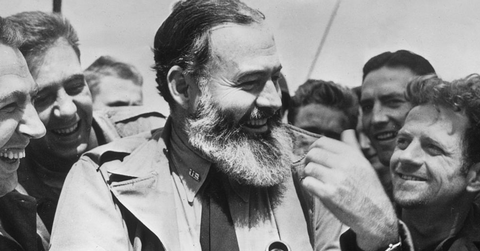Hemingway's Granddaughter Believes Her Family Is Cursed
Updated May 4 2021, 2:21 p.m. ET

If you grew up reading classics like The Sun Also Rises and A Farewell to Arms, then you'll likely be interested in the new three-part, six-hour documentary about American author Ernest Hemingway. The second part airs tonight (April 6) on PBS. Hemingway the documentary dives into the author's life in ways your 11th grade AP English class never did. Specifically, it highlights Hemingway's mental illness, which is rarely discussed.
After a life-long battle with mental illness, Ernest Hemingway shot himself in the head. He was 61 years old. “We were, sort of, the other American family that had this horrible curse,” Mariel Hemingway, the late author's granddaughter says, comparing the Hemingways to the Kennedys.
The Hemingway family deaths: What to know
There have been several suicides in the Hemingway family. This includes his father, who killed himself when Ernest was only 29, three of his siblings (Ernest Jr., Ursula, and Leicester), and his granddaughter, Margaux. Margaux, who was a famous model, took her own life by overdosing on barbiturates. Mariel Hemingway describes her family as extremely creative — but victims to mental health problems and addiction.
“I grew up watching a family that was completely amazing and creative but also destructive and self medicating. All of them, they were addicts. I didn’t want to end up like that. I was on a mission," she said, per the Miami Herald.
In her 2013 documentary, Running From Crazy, Mariel shares that she thinks her own father, Jack Hemingway, sexually abused her sisters Margaux and Joan (her father had passed away in 2000). Mariel told CNN that although she doesn't remember Jack abusing her, she remembers sleeping in her mother's room, which she thinks could have been a way for her mother to protect her. She also added that Jack may not have known what he was doing because he'd be black-out drunk.
However, nobody talked about mental illness in her family up until recently. “Nobody spoke about anything. It was a different generation," Mariel said.
Ernest's last days were extremely troubled, and while it seems as though loved ones did try to help him, he ended up succumbing to his mental illnesses. 1960 was when things began to really take a turn for the worse. Ernest had left Cuba to live in New York City but had traveled to Spain for a photo shoot with Life. Reports of his deteriorating health began circulating, but he assured his wife Mary that he was fine.
When Ernest came back to New York, he refused to leave the NYC apartment, which is when Mary moved him to Idaho. By this point, he was anxious and paranoid about the FBI following him and people stealing his money. He ended up getting treated at the Mayo Clinic in Minnesota and went through electroconvulsive therapy at least 15 times. He was diagnosed with depression, and some medical experts at the time thought his state was due to abusing drugs like Ritalin.
Mary caught Ernest with a gun in their Idaho home, and she called their physician, who admitted him to a hospital where he went through three electroshock treatments. A few months later, he took his own life with his shotgun. Mary had been in total denial and told the press that the death was accidental, but years later she admitted that he had killed himself. These days, his granddaughter Mariel has made it her mission to spread awareness about mental illness.
Learn more about Ernest Hemingway's life and his and his family's battle with mental illness in the documentary Hemingway, which airs tonight at 8 p.m. EST on PBS. The final segment airs tomorrow night, April 7, at 8.
If you or someone you know is contemplating suicide, call the National Suicide Prevention Lifeline at 1-800-273-8255.